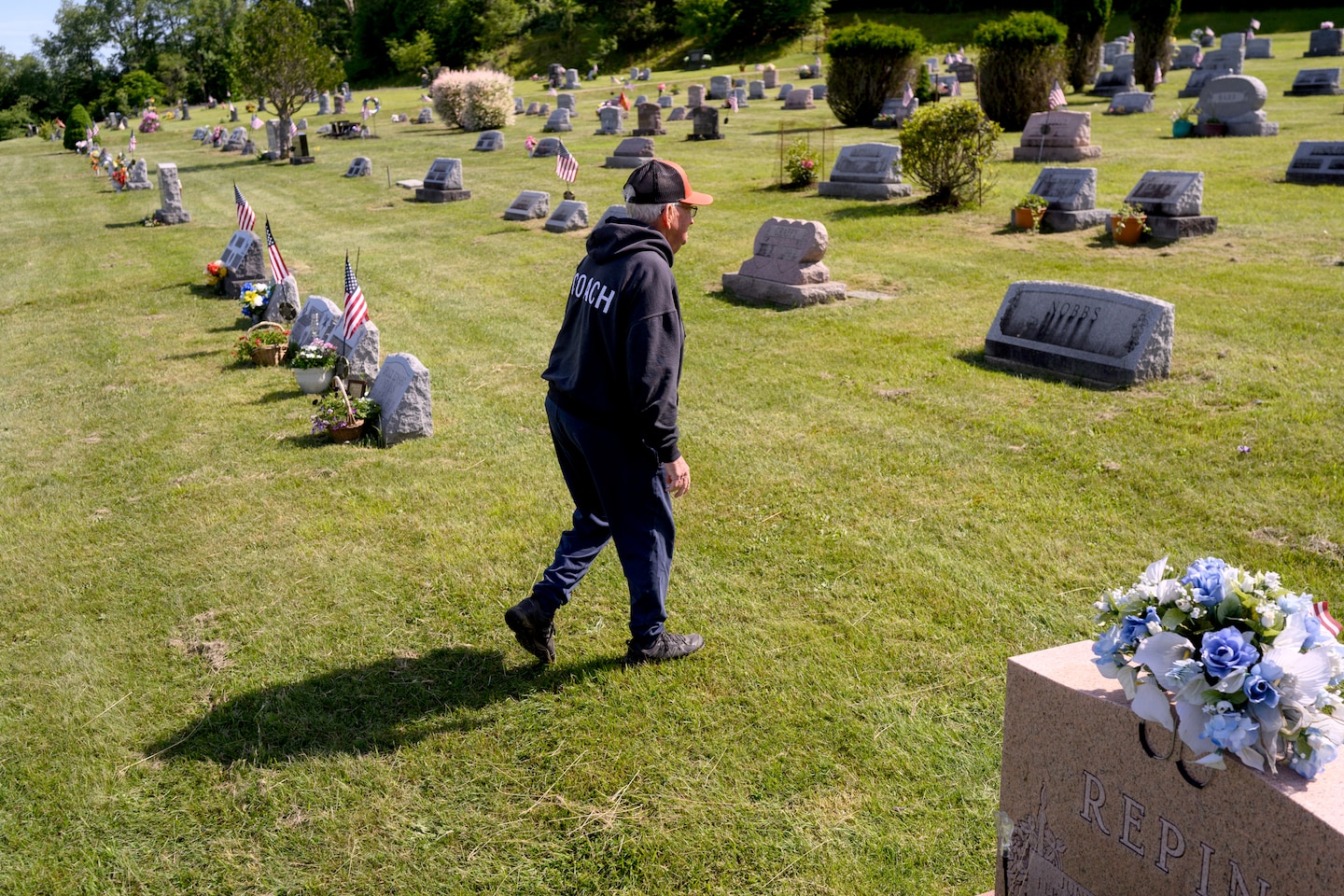- cross-posted to:
- [email protected]
- [email protected]
- cross-posted to:
- [email protected]
- [email protected]
cross-posted from: https://lemmy.world/post/16862977
‘Too many old people’: A rural Pa. town reckons with population loss
There is a deepening sense of fear as population loss accelerates in rural America. The decline of small-town life is expected to be a looming topic in the presidential election.
…
America’s rural population began contracting about a decade ago, according to statistics drawn from the U.S. Census Bureau.
A whopping 81 percent of rural counties had more deaths than births between 2019 and 2023, according to an analysis by a University of New Hampshire demographer. Experts who study the phenomena say the shrinking baby boomer population and younger residents having smaller families and moving elsewhere for jobs are fueling the trend.
According to a recent Agriculture Department estimate, the rural population did rebound by 0.25 percent from 2020 to 2022 as some families decamped from urban areas during the pandemic.
But demographers say they are still evaluating whether that trend will continue, and if so, where. Pennsylvania has been particularly afflicted. Job losses in the manufacturing and energy industries that began in the 1980s prompted many younger families to relocate to Sun Belt states. The relocations helped fuel population surges in places like Texas and Georgia. But here, two-thirds of the state’s 67 counties have experienced a drop in population in recent years.



This isn’t true in the least. Unless the town is a compete derelict.
Again: if you want to buy property in a rural area–not a suburb of a city–you can buy it for a tiny fraction of what you would pay for the same amount of property, or the same house, in an urban or suburban setting. Take this, for example; if you wanted a house this size, and on this much land in Chicago, you’d be looking at a few million. Or here; yeah, it’s in the middle of fucking nowhere, but it’s under $100k. I’m pretty sure it’s not “hoarding” if no one wants it because it’s three hours from Des Moines. If you just want land, then here’s 166 acres for $59,000; It’s in Imlay, NV, and about two hours from Reno, but that’s only $360/acre.
You can’t say that people are “hoarding” property when it’s not property that anyone wants to buy. That would be like saying I’m hoarding dust bunnies under my desk because I haven’t vacuumed in a little over a year.
Nothing in this comment refutes what I said. You’re cherrypicking income from cities with cost of living in rural areas.
100k is affordable in medium sized city with a medium income of 75k but these rural areas have median incomes as low as 25k where it’s unattainable.
And no the average person just can’t buy land. That’s like asking someone to just build their own car. Totally possible, been done before by many people, but not realistic.
And no a remote job isn’t the answer because a lot of these remote rural “cheap” places don’t have reliable high speed internet. Sometimes they don’t have internet at all.
Lastly these areas lack critical services which you’ll have to obtain and pay for yourself somehow. Maybe this “cheap” rural house requires a 3 hour drive to see a specialist. Now someone with a chronic illness is paying an extra couple hundred dollars a month to see a doctor. No city sewer or water, time to dig a well and septic tank. The corrupt city relies on tickets as their primary revenue stream, whoops there’s another few hundred bucks. Long commute means you gotta hire a babysitter until the evening, that’s 10’s of thousands of dollars out the window again.
Study after study has shown that living in poor rural areas is MORE expensive than living in “expensive” cities because of the lack of services and economic opportunity.
Employer won’t give you a raise, and they’re the only major employer in the area so you’re screwed? Add that opportunity cost to the cost of a “cheap” rural home.
This doesn’t even touch on the quality of life issues. Your kid got hooked on meth because your podunk town is utterly devoid of culture or activities? Well at least you have that 100k “cheap” home. Oh and BTW crime per capita is much worse in rural red states than big scary blue cities.
You’re being willfully obtuse.
You’ve created a title that has absolutely nothing to do with the article. You’re acting as though corporations that are buying housing in cities and suburbs are to blame for the deaths of small towns in rural America, and implying that the people that are dying off in rural parts of the country are “hoarding” property. That’s simply false.
THIS IS THE POINT. You’re taking two completely different things, one of which isn’t even covered in the article you posted, and conflating them to act as though they’re the same thing.
…What? What are you talking about? The average person can absolutely just buy land. It’s exactly the same process as buying a house that’s already built, only with a few extra steps, like hiring an architect, and getting a general contractor. You can even use an FHA mortgage–which is the kind of mortgage that most first-time buyers are likely to use–to buy land and get a house built. (You usually can’t built it yourself though, unless you’re also a contractor; the mortgage bank wants to know that you aren’t going to take the money and run, so they want plans, permits, etc.) Most people don’t, because vacant land in cities–which is where most people want to live–is ridiculously expensive.
I’m going to need to see a citation on that. In Georgia, for 2022 the [overall state crime rate is 20.10/1000 people](file:///C:/Users/GA1/Downloads/2022%20Crime%20Statistics%20Summary.pdf). The five counties that comprise Atlanta - Fulton, DeKalb, Cobb, Gwinnett, and Clayton - are 30.5/1000, 40.25/1000, 17.16/1000, 14.54/1000, and 9.85/1000 respectively. Only Bibb (city of Macon) and Crisp (very rural) counties have worse overall crime rates than DeKalb county. Very few counties have worse crime rates than Fulton. (I tried to look up Illinois, but for some reason the IL State PD’s site won’t let me see the report.)
And ALL OF THIS IS IRRELEVANT to your claim that the death of small towns is somehow linked to “real estate hoarders”.
Right, it’s my cheeky editorial. It’s a crosspost so of you want to know what the article is really about just read the original tittle.
No I’m not. 70% of all rentals are owned by Mom and Pop landlords. Boomers are 2/3rds of all homeowners. These small towns are primarily occupied by Boomers who greed drove out families from small towns and locals that were actually interested in staying. I can tell you living in a big city I meet lots of small town people and many of them say there were driven out by greedy landlords and had to take better paying jobs in the city.
Elderly people stay in these small towns BECAUSE THEY CAN AFFORD TO. Often because THEY OWN REAL ESTATE. Working families leave BECAUSE THEY CAN’T AFFORD TO STAY even if they would like to.
People like you act like it’s some mystery why young people leave and old people stay in small towns even though nominally homes are cheaper. IT’S BECAUSE IT’S NOT ACTUALLY CHEAPER.
These old boomers are entrenched economically so they gut services like schools because they don’t need them, enriching themselves further, then wonder why families don’t want to stay in a place where they’ve got to do everything themselves.
No the average person can’t develop real estate.
Large blue cities like Chicago have lower crime rates than many Midwestern red cities and towns.
eh, I strongly doubt that, but they do wonder why all the labor has moved away and no one wants their pittances anymore. then they blame the avocado toast, throw their hands in the air and donate to trump.
You 100% are conflating two entirely different things. Nothing in the article was about people ‘hoarding’ real estate. You literally made up a title that had nothing to do with the article that you posted.
That is entirely false. Where are you getting this from? Small towns are dying because the economy is centralizing on cities. Employers want to be close to infrastructure, and close to potential employees. Coal mining is shutting down–which is a good thing–and that’s decimating mining towns, because the mines, and businesses that supported the mines, were the only game in those towns. Farms are getting consolidated, which means fewer services are needed for farmers in farm towns. Mills that used to make fabric, and factories that used to sew garments, have almost entirely moved overseas as corporations cut their costs, so mill towns no longer have job. The big three auto manufacturers have moved large amounts of manufacturing to Mexico, leaving a lot of towns in Michigan, for instance, with very, very few jobs.
Think this through. If you’re going to open, say, a semi-conductor factory, what do you want? Do you want to be close to interstate highways? Do you want to be close to wastewater treatment? Do you want to be close to railyards and airports? Do you want a large potential pool of skilled and educated labor? Or do you want to be in the middle of rural West Virginia? (Look where the recent semi-conductor facilities are being built; they’re all within relatively easy commuting distance of a major metropolitan area. Not rural areas.)
The kids are moving out of these towns because there are no opportunities; if they want jobs, they have to move. That’s not the fault of people ‘hoarding’ property, that’s the fault of corporations pulling out, and the fault of national trade policy that encouraged corporations to move manufacturing out of the country.
…Yeah, they def. can. The fact that you think it’s impossibly hard to, I dunno, hire an architect and a contractor is pretty amusing. I’ve had to hire both when I lived in a city, because you need to file plans and get permits to do any necessary repairs to an existing structure. The only added step there is that you’re going to have to coordinate with your mortgage broker as well. But if you think that average people can’t hire an architect and a contractor, then you’re implicitly saying that the average person also can’t buy any property in any city that has code enforcement of any kind.
So, no sources. Cool.
‘You can’t say that people are “hoarding” property when it’s not property that anyone wants to buy.‘
But people (and organizations) are hoarding properties that people want to buy.
It’s my inference. A big part of why people leave small towns now is because they can’t afford the cost of living with the average income they can realistically obtain in said small towns. I’ve lived in small towns, the relative cost of living can be higher than a city.
…Which is not what the article you posted–with your title “Real Estate hoarders dying off like flies”–was about in the slightest.